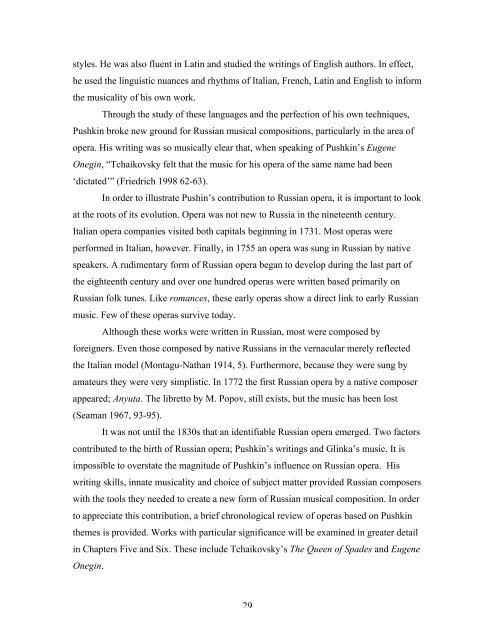Alexander Pushkin's Influence on Russian Ballet
Alexander Pushkin's Influence on Russian Ballet
Alexander Pushkin's Influence on Russian Ballet
You also want an ePaper? Increase the reach of your titles
YUMPU automatically turns print PDFs into web optimized ePapers that Google loves.
styles. He was also fluent in Latin and studied the writings of English authors. In effect,<br />
he used the linguistic nuances and rhythms of Italian, French, Latin and English to inform<br />
the musicality of his own work.<br />
Through the study of these languages and the perfecti<strong>on</strong> of his own techniques,<br />
Pushkin broke new ground for <strong>Russian</strong> musical compositi<strong>on</strong>s, particularly in the area of<br />
opera. His writing was so musically clear that, when speaking of Pushkin’s Eugene<br />
Onegin, “Tchaikovsky felt that the music for his opera of the same name had been<br />
‘dictated’” (Friedrich 1998 62-63).<br />
In order to illustrate Pushin’s c<strong>on</strong>tributi<strong>on</strong> to <strong>Russian</strong> opera, it is important to look<br />
at the roots of its evoluti<strong>on</strong>. Opera was not new to Russia in the nineteenth century.<br />
Italian opera companies visited both capitals beginning in 1731. Most operas were<br />
performed in Italian, however. Finally, in 1755 an opera was sung in <strong>Russian</strong> by native<br />
speakers. A rudimentary form of <strong>Russian</strong> opera began to develop during the last part of<br />
the eighteenth century and over <strong>on</strong>e hundred operas were written based primarily <strong>on</strong><br />
<strong>Russian</strong> folk tunes. Like romances, these early operas show a direct link to early <strong>Russian</strong><br />
music. Few of these operas survive today.<br />
Although these works were written in <strong>Russian</strong>, most were composed by<br />
foreigners. Even those composed by native <strong>Russian</strong>s in the vernacular merely reflected<br />
the Italian model (M<strong>on</strong>tagu-Nathan 1914, 5). Furthermore, because they were sung by<br />
amateurs they were very simplistic. In 1772 the first <strong>Russian</strong> opera by a native composer<br />
appeared; Anyuta. The libretto by M. Popov, still exists, but the music has been lost<br />
(Seaman 1967, 93-95).<br />
It was not until the 1830s that an identifiable <strong>Russian</strong> opera emerged. Two factors<br />
c<strong>on</strong>tributed to the birth of <strong>Russian</strong> opera; Pushkin’s writings and Glinka’s music. It is<br />
impossible to overstate the magnitude of Pushkin’s influence <strong>on</strong> <strong>Russian</strong> opera. His<br />
writing skills, innate musicality and choice of subject matter provided <strong>Russian</strong> composers<br />
with the tools they needed to create a new form of <strong>Russian</strong> musical compositi<strong>on</strong>. In order<br />
to appreciate this c<strong>on</strong>tributi<strong>on</strong>, a brief chr<strong>on</strong>ological review of operas based <strong>on</strong> Pushkin<br />
themes is provided. Works with particular significance will be examined in greater detail<br />
in Chapters Five and Six. These include Tchaikovsky’s The Queen of Spades and Eugene<br />
Onegin.<br />
29

















